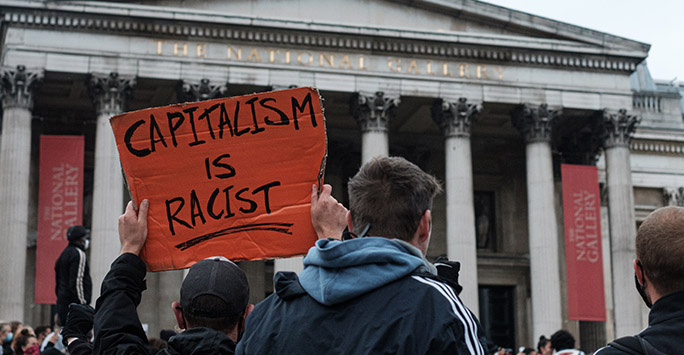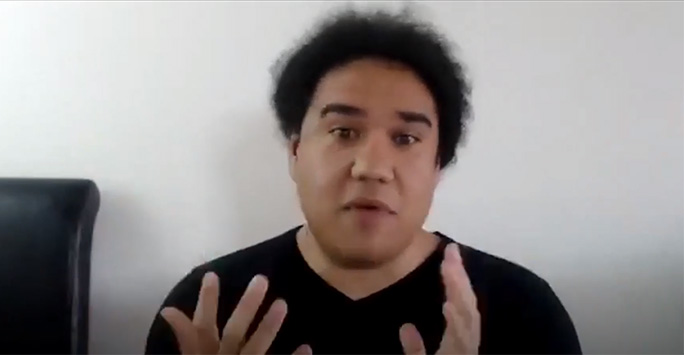
Racism and international law have hit the headlines recently, often in the same story. In these stories, international law tends to be understood as curtailing or constraining the actions of racist, right wing politicians – serving as the hero or villain of the piece depending on one’s political outlook. On Tuesday 20 October 2020, as part of Black History Month, Dr Robert Knox gave an online lecture on Race and International Law. The event was recorded and the video is now available to watch. Here, in a follow-up blog, Robert introduces the lecture and offers further reflections.
International law has appeared to frustrate the ability of right-wing figures to push through their political programmes.
In recent months, international law and institutions have repeatedly appeared in the headlines. From the Conservative Party’s avowed breach of international law (albeit in a ‘very specific and limited way’), to Donald Trump’s fulminating against the International Criminal Court and the World Health Organisation, international law has appeared to frustrate the ability of right-wing figures to push through their political programmes.
These presentations of international law have, of course, coincided with a global anti-racist uprising. The movements, activists and thinkers of these anti-racist uprisings have forcefully demonstrated that our contemporary societies were founded on deep racial inequality, with the consequences of that inequality being felt today. These anti-racist movements have faced deep criticism from the aforementioned right-wing political parties and forces, with the newly-discovered ‘Critical Race Theory’ becoming a particular bête-noire.

Dr Robert Knox giving his online lecture on Tuesday 20 October 2020.
International law, with its focus on equality, cooperation and the protection of oppressed and minority groups, is on the side of the angels.
Presented in this light, the story for international law seems somewhat heroic. The particularist, nativist forces of the right arrayed against the anti-racist movement have turned their ire against a cosmopolitan, universal international law. International law, with its focus on equality, cooperation and the protection of oppressed and minority groups, is on the side of the angels.
This heroic story corresponds very closely with international law’s ‘self-image’. For many international lawyers the relationship between international law and racism is clear. In general, international law holds to a vision of liberal universalism, in which racial difference is to have no detrimental effect, and indeed in which race is almost never explicitly invoked. Insofar as race is invoked – in for example the International Convention on the Elimination of All Forms of Racial Discrimination – it is to condemn racism. On this reading, international law has an anti-racist character.
In this talk I contest this account. I argue that it depends on a flawed understanding of race and racism and their connection to law. Essentially, the above accounts treat racism as occurring when some objective, pre-existing ‘racial group’ is subject to discrimination. Accordingly, a formally equal, liberal law will – almost by definition – be anti-racist (or at least not racist). Such an account thus imagines that ‘racism’ is a product of ‘race’.
However, such accounts cannot hold up to scrutiny. They ultimately imply a stable, objective basis to ‘race’ which it does not have, and – in so doing – reproduce those very same assumptions held by racist thinking. By contrast I argue, drawing on black, anti-colonial and Third World Marxisms, that that ‘race’ is in fact a product of ‘racism’. Rather than an objective pre-existing set of characteristics ‘race’ is made through social and historical processes of racialisation. These processes of racialisation act to sort people into global hierarchies in the context of economic exploitation.
By turning our attention to the processes through which race is made, we are able to see the more complex inter-penetration of international law and race. Even when modern international law does not explicitly mention race, it nonetheless plays a key role in its constitution. In the lecture I demonstrate how – through its intimate and structural connection with capitalism – international law has taken on a race-making character historically, and that this carries on into the present day.
Watch the recording of the lecture
Robert Knox

Dr Robert Knox is a Senior Lecturer in Law at the School of Law and Social Justice, University of Liverpool and is Director of the Critical Approaches to International Criminal Law (CAICL) research cluster.
Robert was appointed Lecturer in Law at the School of Law and Social Justice in September 2014. Prior to this he completed his PhD thesis at the London School of Economics and Political Science. He obtained his BA and LLM in Law at Downing College, University of Cambridge.
Robert’s research interests lie in the fields of legal theory – particularly critical and Marxist legal theory – and public international law – particularly as relating to the law on the use of force. His PhD research examined how Marxist and Third Worldist theorists and activists of international law have understood the relationship between imperialism and international law.
Email: robknox@liverpool.ac.uk